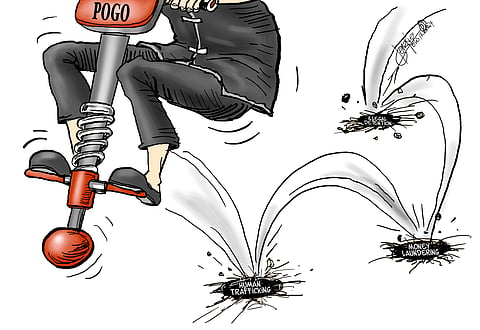
- NEWS
- the EDIT
- COMMENTARY
- BUSINESS
- LIFE
- SHOW
- ACTION
- GLOBAL GOALS
- SNAPS
- DYARYO TIRADA
- MORE

The rise of Philippine Offshore Gaming Operators (POGOs) has been a double-edged sword for the Philippines. On one hand, they have generated significant revenues and created jobs. On the other, they have brought a host of negative issues that arguably outweigh their benefits.
With the recent raids in Tarlac and Pampanga exposing alleged threats to national security, it probably is time to seriously consider banning POGO operations in the country.
Reports of criminal activities such as human trafficking, money laundering, and illegal detention have become alarmingly frequent. These illicit activities not only undermine the rule of law but also tarnish the country’s international image.
The social fabric of communities hosting POGOs has been disrupted, with an increase in crimes and social unrest.
Recent POGO raids have unveiled a disturbing trend: The operations are not just about gambling; they pose a significant threat to national security. The raids exposed the presence of undocumented foreign workers, sophisticated equipment for cyber operations, and a potential network for espionage.
The influx of foreign nationals working in POGOs, often without proper documentation, makes it challenging for authorities to monitor and regulate their activities effectively.
Moreover, there are growing concerns that these operations could be used as a cover for espionage. With the Philippines’ strategic location and its ongoing territorial disputes in the South China Sea, the potential for POGOs to be leveraged for intelligence gathering by foreign entities cannot be dismissed lightly. This threat to national security is too significant to ignore.
Regulating POGOs has proven to be a daunting task for Philippine authorities. The industry operates in a legal grey area, often evading taxes and flouting labor laws. Efforts to impose stricter regulations have met limited success, primarily due to the opaque nature of offshore operations and the involvement of powerful vested interests.
The lack of stringent regulatory frameworks and enforcement mechanisms also makes it nearly impossible to ensure compliance, thereby exacerbating the issues associated with POGOs.
The human rights implications of POGO operations are equally troubling. There have been numerous reports of workers being subjected to poor working conditions, with limited access to basic rights and protections. In some instances, foreign workers are held against their will, deprived of their passports, and forced to work under duress.
These practices are not only inhumane but also violate both local and international labor laws.
The presence of POGOs has had a significant impact on local communities, particularly in terms of public safety and housing. The influx of foreign workers has driven up rental prices, making it difficult for local residents to find affordable housing.
Additionally, the rise in criminal activities associated with POGOs has strained local law enforcement agencies and increased the sense of insecurity among residents.
Given these multifaceted issues, it is imperative for the Philippine government to reconsider the presence of POGOs in the country. Banning POGO operations would send a strong message that the Philippines prioritizes the rule of law, national security, and the well-being of its citizens over short-term economic gains.
The government should focus on developing more sustainable and secure sources of revenue that do not come with the baggage of criminality and national security risks. Banning POGOs would not only mitigate these risks but also reaffirm the Philippines’ commitment to protecting its national interests and upholding the rule of law.
